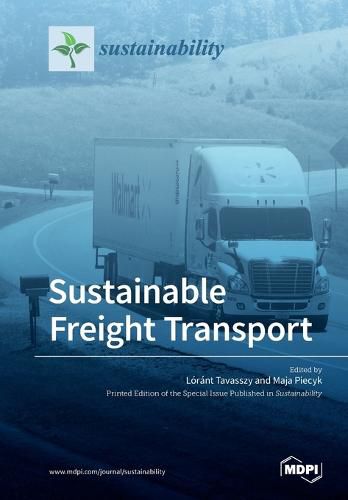Readings Newsletter
Become a Readings Member to make your shopping experience even easier.
Sign in or sign up for free!
You’re not far away from qualifying for FREE standard shipping within Australia
You’ve qualified for FREE standard shipping within Australia
The cart is loading…






This title is printed to order. This book may have been self-published. If so, we cannot guarantee the quality of the content. In the main most books will have gone through the editing process however some may not. We therefore suggest that you be aware of this before ordering this book. If in doubt check either the author or publisher’s details as we are unable to accept any returns unless they are faulty. Please contact us if you have any questions.
This Special Issue of Sustainability reports on recent research aiming to make the freight transport sector more sustainable. The sector faces significant challenges in different domains of sustainability, including the reduction of greenhouse gas emissions and the management of health and safety impacts. In particular, the intention to decarbonise the sector’s activities has led to a strong increase in research efforts–this is also the main focus of the Special Issue. Sustainable freight transport operations represent a significant challenge with multiple technical, operational, and political aspects. The design, testing, and implementation of interventions require multi-disciplinary, multi-country research. Promising interventions are not limited to introducing new transport technologies, but also include changes in framework conditions for transport, in terms of production and logistics processes. Due to the uncertainty of impacts, the number of stakeholders, and the difficulty of optimizing across actors, understanding the impacts of these measures is not a trivial problem. Therefore, research is not only needed on the design and evaluation of individual interventions, but also on the approach of their joint deployment through a concerted public/private programme. This Special Issue addresses both dimensions, in two distinct groups of papers–the programming of interventions and the individual sustainability measures themselves.
$9.00 standard shipping within Australia
FREE standard shipping within Australia for orders over $100.00
Express & International shipping calculated at checkout
This title is printed to order. This book may have been self-published. If so, we cannot guarantee the quality of the content. In the main most books will have gone through the editing process however some may not. We therefore suggest that you be aware of this before ordering this book. If in doubt check either the author or publisher’s details as we are unable to accept any returns unless they are faulty. Please contact us if you have any questions.
This Special Issue of Sustainability reports on recent research aiming to make the freight transport sector more sustainable. The sector faces significant challenges in different domains of sustainability, including the reduction of greenhouse gas emissions and the management of health and safety impacts. In particular, the intention to decarbonise the sector’s activities has led to a strong increase in research efforts–this is also the main focus of the Special Issue. Sustainable freight transport operations represent a significant challenge with multiple technical, operational, and political aspects. The design, testing, and implementation of interventions require multi-disciplinary, multi-country research. Promising interventions are not limited to introducing new transport technologies, but also include changes in framework conditions for transport, in terms of production and logistics processes. Due to the uncertainty of impacts, the number of stakeholders, and the difficulty of optimizing across actors, understanding the impacts of these measures is not a trivial problem. Therefore, research is not only needed on the design and evaluation of individual interventions, but also on the approach of their joint deployment through a concerted public/private programme. This Special Issue addresses both dimensions, in two distinct groups of papers–the programming of interventions and the individual sustainability measures themselves.